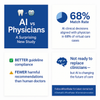💥 What Dental Professionals Should Know About Creatine
Creatine, a naturally occurring compound found in muscle and brain tissue, is commonly known for boosting athletic performance. But new research suggests its health benefits extend far beyond the gym, especially in supporting muscle maintenance, cognitive health, and possibly oral-systemic outcomes.
🧠 Dr. Richard Kreider, director of Texas A&M’s Exercise & Sport Nutrition Lab, emphasizes that creatine plays a critical role in cellular energy by forming creatine phosphate, which fuels tissues during stress or metabolic demand.
✅ Daily Creatine Needs Are Often Unmet
-
The body synthesizes only ~1 gram per day of creatine
-
Most people need 2–4 grams daily for optimal health
-
Creatine-rich foods: meat, poultry, fish
-
Vegetarians, older adults, and adolescents may benefit most from supplementation
🏋️ For athletes, a loading phase (5g, 4x/day for 1 week) followed by 5–10g/day helps improve energy and recovery.
🧓 Creatine Benefits for Seniors, Teens—and Beyond
Research supports creatine supplementation to:
-
Prevent sarcopenia (age-related muscle loss)
-
Support brain function and memory in older adults
-
Aid adolescent development, especially with low dietary intake
-
Reduce risks of muscle cramping by improving fluid retention
A recent review of 685 clinical trials published in the Journal of the International Society of Sports Nutrition confirmed no significant adverse effects, debunking myths about bloating and cramping.
🦷 Creatine’s Emerging Role in Dental Health
While creatine’s effects on oral health are still being explored, its anti-inflammatory properties, support for energy metabolism, and muscle preservation may benefit postoperative recovery, jaw function, and overall patient vitality—especially in older or medically compromised patients.
🪥 Clinical Tip for Dental Teams:
Integrate creatine discussions into nutrition and wellness counseling, especially for patients recovering from surgery, those with TMD/jaw fatigue, or seniors at risk of muscle loss. Consider including creatine status in interdisciplinary patient care or referrals.




